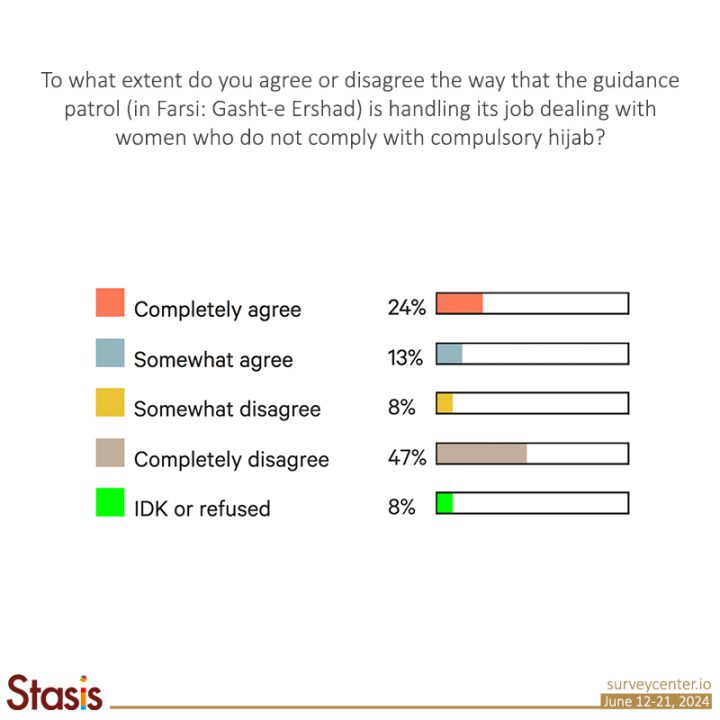
Most Iranians oppose the government’s approach to women’s veiling practices
The majority of Iranians are against the way the government is dealing with the hijab issue. Sixty-eight percent say they oppose the government imposing strict penalties, such as fines or imprisonment, upon women who do not wear their hijab in public. Moreover, 55 percent of the respondents say they are against the way that the Guidance Patrol (in Farsi: Gasht-e-Ershad) treats women who are noncompliant with compulsory hijab. In response to a question measuring Iranian public opinions of a hijab-optional policy, 54 percent expressed agreement.
These findings are based on a representative poll conducted by Stasis Consulting between June 12 and June 21, 2024, among 1,223 respondents aged 18 and older living in Iran.
Hijab and Impose Penalties
Iran’s government has tried to impose strict penalties, such as fines or imprisonment, upon women who do not follow compulsory hijab by refusing to wear a veil in public. Sixty-eight percent of Iranians say they oppose the government’s strict penalties for women who do not wear the hijab in public, including 61 percent who completely disagree.
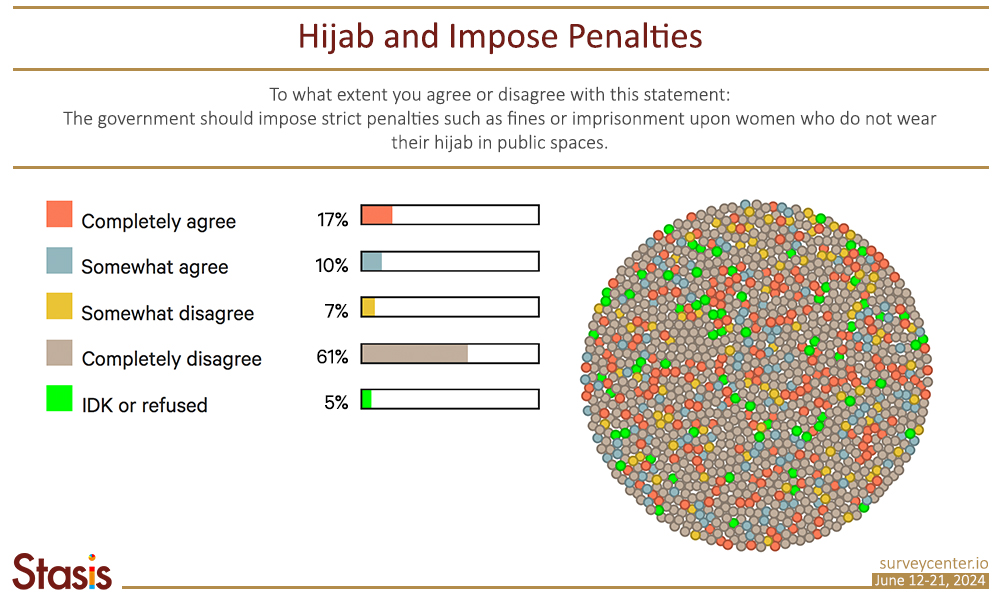
The level of disagreement with the government on this issue is consistent across two main demographic groups, age and gender. However, college-educated Iranians or those residing in urban areas are more likely to express their disagreement.
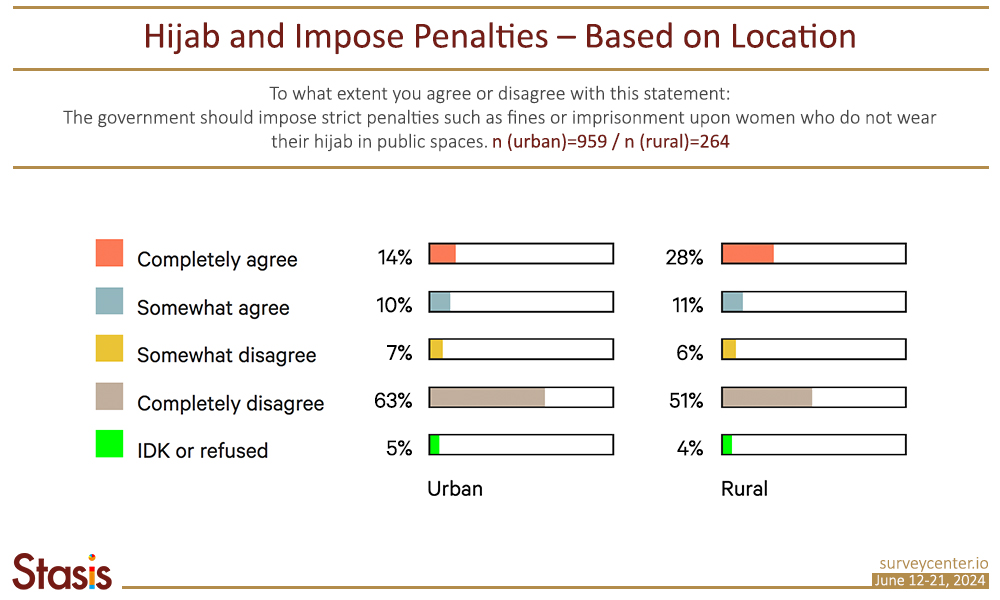
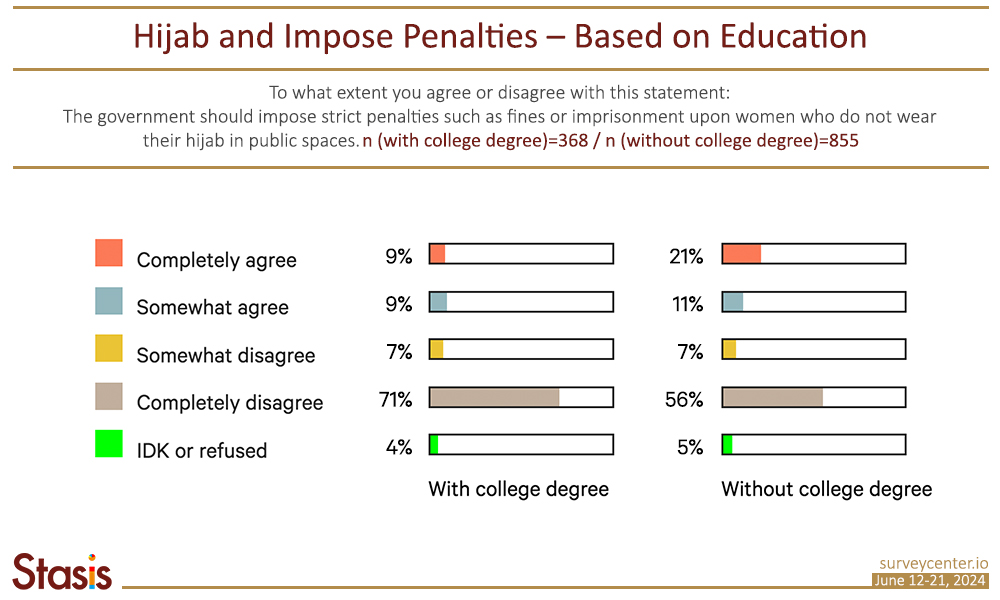
A majority of Iranians dislike the Guidance Patrol (Gasht-e-Ershad) and prefer optional hijab.
According to this survey, 55 percent of respondents say they are against the way the Guidance Patrol is handling its job of dealing with women who do not comply with compulsory hijab. Those who agree with the Guidance Patrol’s role consist of 37 percent of the population.
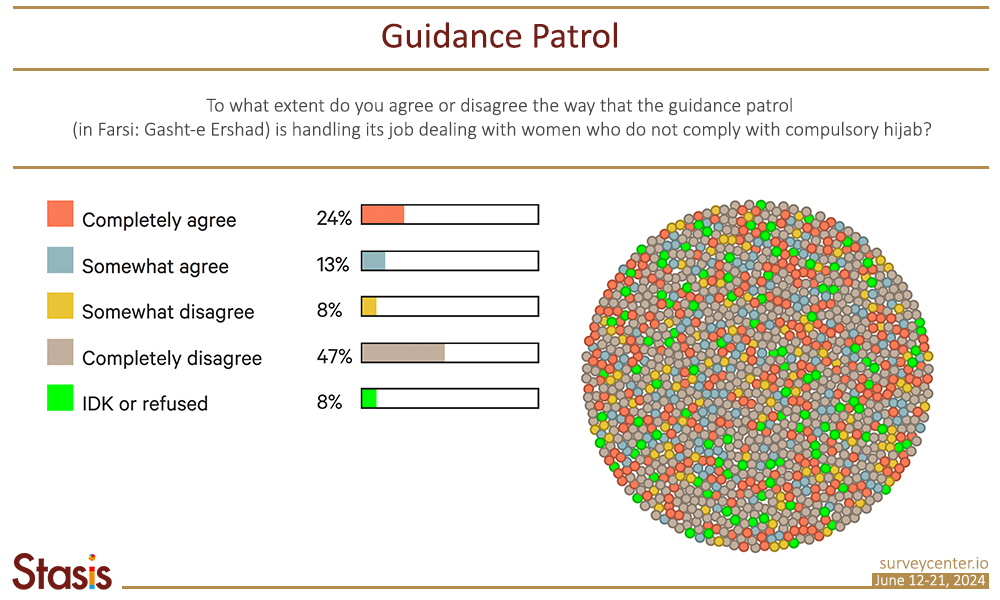
Optional Hijab
In response to the question measuring Iranians’ agreement or disagreement with optional hijab, 54 percent agree that hijab should be optional vs. 43 percent who disagree. Educated Iranians or those residing in urban areas are more likely to express their agreement.
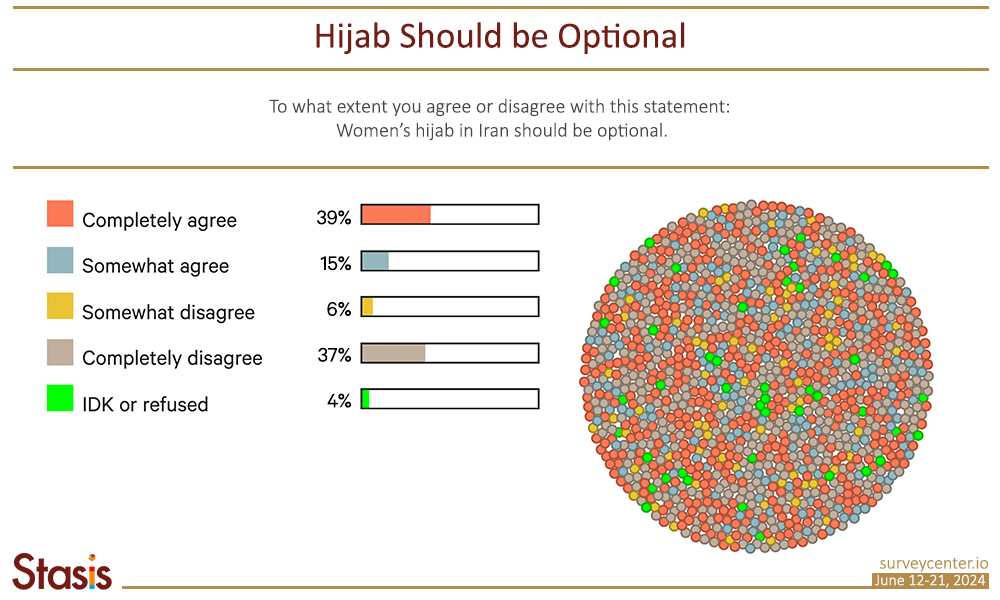
Analysis of Hijab opinions among the candidates’ supporters
Among those who prefer the hardliner candidate, Mr. Jalili, 58% approve of the Guidance Patrol as opposed to 35% who disapprove. Just 31% of Jalili’s supporters approve of a hijab-optional policy vs. 68% who believe in mandatory hijab. His supporters are more split on the question of strict penalties like fines or imprisonment for women who do not follow compulsory hijab rules (41% are in favor while 57% oppose strict penalties).
Respondents who favor the more moderate conservative Speaker Qalibaf for president have softer views on the government’s approach to hijab policing. Of Mr. Qalibaf supporters, 53% approve of the Guidance Patrol job vs. 43% who disapprove. Moreover, 47% approve of a hijab-optional policy as opposed to 51% who prefer a compulsory mandate. Among this camp, 40% of respondents believe that the government should impose strict penalties upon women who do not veil in public (56% disagree).
Among those of Mr. Pezeshkian supporters, just 23 percent approve of the Guidance Patrol as opposed to the 72 percent majority who disapprove. A significant majority of Pezeshkian voters are in favor of a hijab-optional policy while only 24% believe in mandatory hijab. against the optional hijab. Finally, 82 percent are against imposing strict penalties on women who do refuse to veil (16% hold a different view).
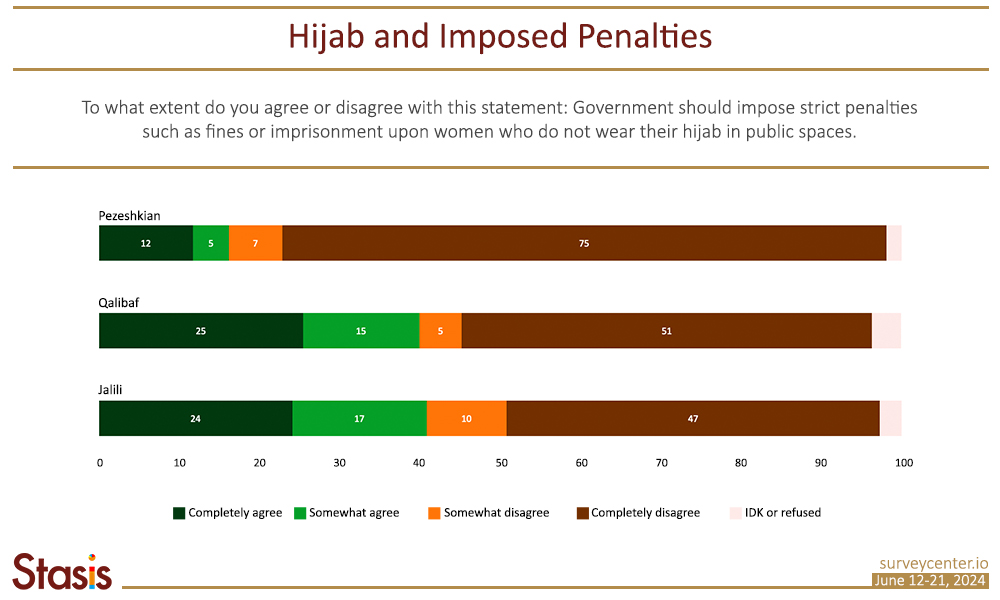
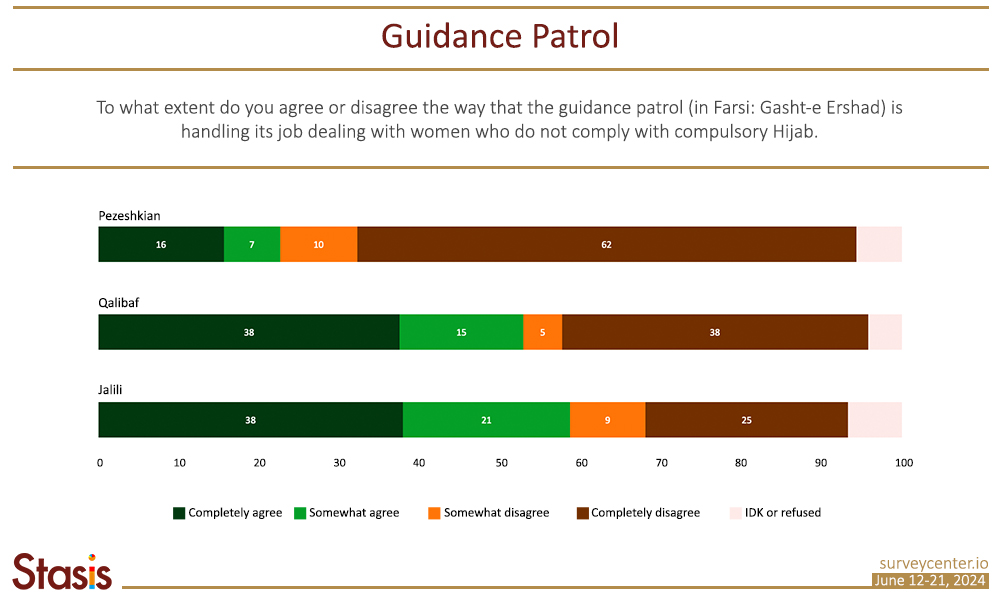
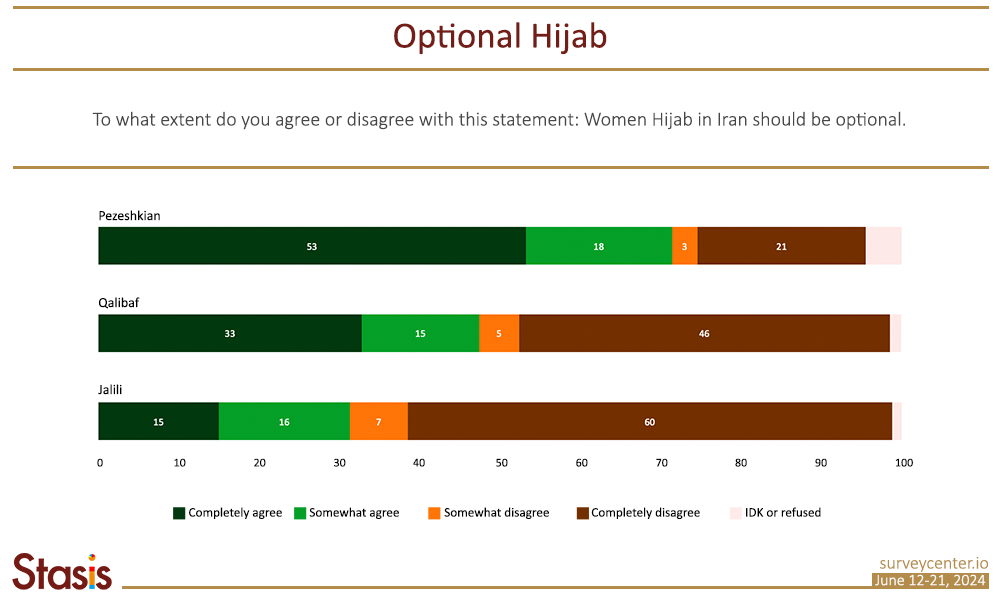
Iranians are in favor of the idea of a referendum.
Most Iranians are in favor of the idea of a referendum, with 77% agreeing that in the case of important economic, political, social, and cultural matters, the people of Iran should have the power to call a national referendum to resolve differences. The level of strong majority agreement with the idea of a referendum is universal across different demographic groups. These results are comparable to our May 2021 survey, in which 81% of respondents were in favor of a referendum.
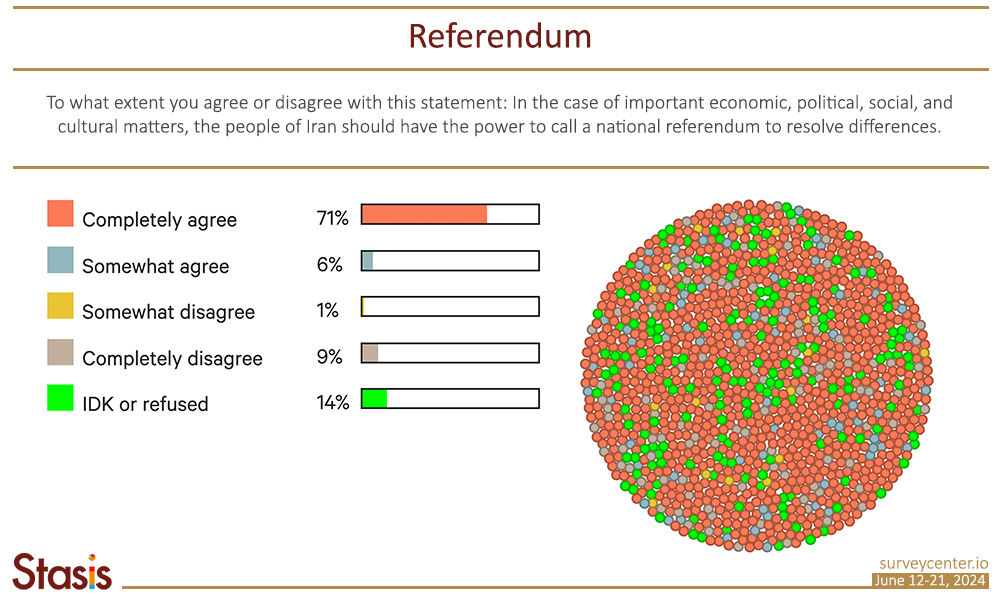
The majority of respondents, irrespective of their voting preferences say they support the idea of a referendum. There are greater degrees of enthusiasm for a referendum among the Qalibaf camp (85%) compared with the Pezeshkian and Jalili supporters (79% and 70%) respectively. Jalili supporters are more likely to oppose the idea (22%) than those in favor of another candidate (7%, opposition among Qalibaf and Pezeshkian supporters).
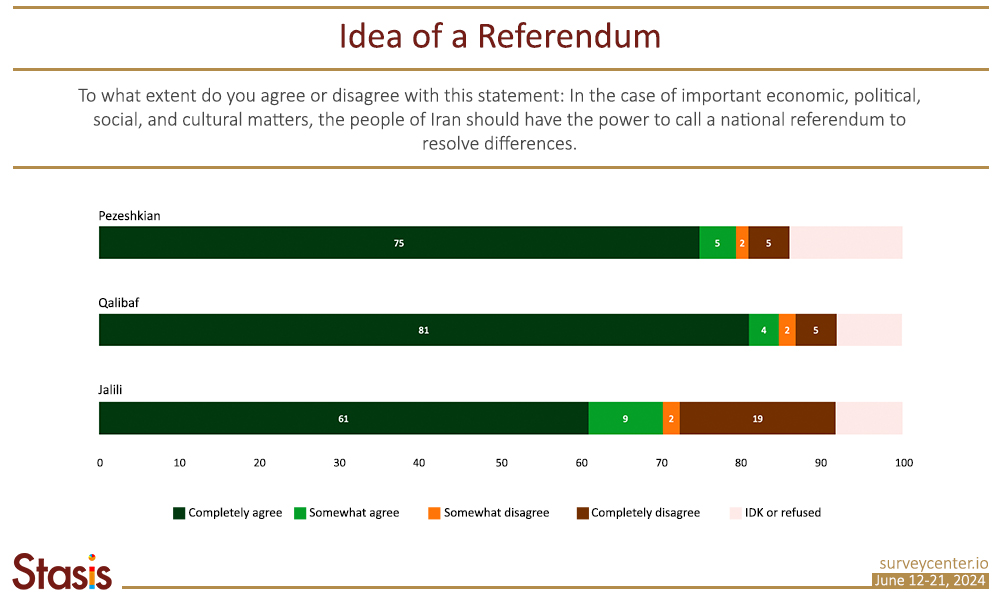
Drug usage is thought to be quite common among Iranian youth.
The vast majority of Iranians (88 percent) believe that drug use is common among Iranian youth. Just 8 percent disagree.
Iranian citizens say they are overtaxed.
Forty-seven percent of respondents believe Iranian citizens pay more taxes to the government than they
should, as opposed to 37 percent who do not believe this statement is true. The difference among respondents to this statement is clearly associated with their level of education.
Remarks
The results of this poll have been interactively visualized in this link. This is an interactive platform detailing the results of every question, distinguished in a bar chart by gender, age group, location, and education.
For each question, there is also a bubble chart (consisting of many small circles), detailing the respondents’ information. Each circle represents a single respondent; clicking on any given circle will generate the complete answer set for that particular respondent. The color coding is consistent between the bubble chart and bar chart for easy comparison.
Methodology
Survey methodology explained below:
- Telephone interviews were conducted between June 1221, 2024, among 1,223 respondents aged 18 and older living in Iran. Native Farsi speakers conducted the interviews during daytime hours.
- The proportional two-stage sample includes respondents from every province. Provinces have been sampled based on their population.
- Results are weighted by gender, age, location (urban vs. rural areas), and adjusted for Tehran’s province based on the Iranian national census of 2016, the 2018 statistical yearbook, and Iran’s Statistical Center demographic predictions for the year 2024.
- Based on the sample, there is a 95 percent confidence that the margin of sampling error is within ±2.8 percentage points.
- Rates of respondent candor and reliability were appraised by experienced interviewers. Fifty-eight persons found to be lacking in these areas were removed from the sample and are not included in the final sample or in this report.
- The response rate for this survey was 32.3%.
- This poll was carried out by Stasis in association with the Middle East Institute.